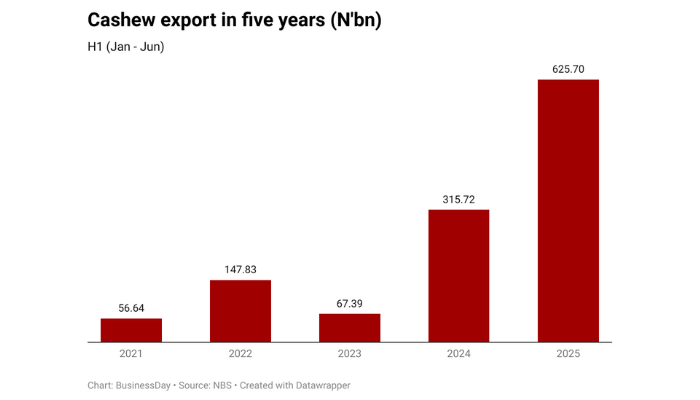Favourable weather lifts Nigeria’s cashew earnings 11-fold
Nigeria’s cashew export earnings surged to a five-year high in the first six months (H1) of 2025 (H1), rising 11-fold to N626 billion, driven by clement weather that bolstered output.
Data from the National Bureau of Statistics (NBS) show that Nigeria’s cashew exporters earned N56.64 billion in H1 of 2021, but the figure rose to N626 billion in H1 2025, marking an 11-fold increase over the period.
Cashew exporters earned N147.83 billion in H1 of 2022 and N67.39 billion H1 of 2023, N315.72 billion in H1 2024, the NBS data show.
The 2025 figure represents nearly double of the N315.72 billion earnings seen last year.
Farmers attributed the export boom to favourable weather conditions that boosted cashew production.
Read also: Ademola Adesokan appointed as Nigeria cashew association president
Weather impact
According to them, adequate rainfall supported cashew growth in the outgone season, spanning February to July and increased output across the major growing region.
Farmers had projected at the beginning of the planting season earlier in the year that conducive weather would bolster production of the commodity.
Yunusa Enemali, president of the National Apex of Cashew Farmers, Processors and Marketing Cooperative Limited, told BusinessDay that “a friendly climate led to cashew export surge in the first half of the year.”
“There is more attention in the cashew sector today. A lot of young people are coming into the value chain, and this is driving a surge in production,” he said.
Enemali said with more value addition, earnings can be tripled, as “all parts of cashew, including the shell, can be converted into money because they are in high demand in other countries.”
A major chunk of shelled cashew nuts was sent to Vietnam and India, two of Nigeria’s long-standing trade partners.
Agro commodity export remains a key driver of foreign exchange (FX) for Africa’s most populous nation, and for years, cashew has proven to be a flagship crop, maintaining a solid streak at the top of agric export list annually.
The 2025/2026 cashew season output was boosted by sufficient rainfall, which allowed cashew fruits to remain on their trees until harvest.
“Last year, wind and drought caused our cashew fruits to fall from their trees before maturity,” said Hassan Suleiman, a Kogi-based cashew farmer, who said his harvest was so large that he had to employ more labourers during harvest this year.
“There was constant rainfall this year, which led to my farm producing so many cashew fruits,” he stated. “This year was different from last year, where drought and inconsistent rainfall affected us negatively.”
Output capacity
Nigeria is the eighth largest producer of the flagship nut in Africa, with an average production capacity of 90,000 metric tons (MT), according to the Food and Agriculture Organisation (FAO).
With global demand at 5.7 million MT annually, Nigeria’s 90,000 MT—just two percent in contribution—shows how underutilised the sector remains despite recent gains.
Côte d’Ivoire leads the pack in Africa, with an annual production capacity of 1.4 million MT, contributing 24 percent to global demand.
Processing offers much more
Regarded as one of the world’s favourite fruits, cashew is in high demand globally. Its versatility makes it even more desirable.
Cashew kernels can be transformed into oil, butter, sweets, and other high-value products, but less than 10 percent of Nigeria’s cashew is processed locally.
Read also: Julius Berger abandons cashew venture to focus on core business
While Nigeria and Côte d’Ivoire share the same cashew trade partners, the Francophone country is ahead through its effective policies that support value addition. The country has a policy that aims to export more processed cashews by 2030.
“Nigeria, blessed with vast arable land and enterprising farmers, is well-positioned to become a dominant player in the dynamic global value chain,” said Nonye Ayeni, executive director, Nigerian Export Promotion Council (NEPC) at a recent cashew processing launch.
Industry leaders say with investments in cashew processing, Nigeria can earn more from export, “way more than we earn from raw export today.”
At a time when dollar scarcity weighs heavily on the naira, cashew — in all its forms – remains a reliable source of foreign exchange, Enemali added.

